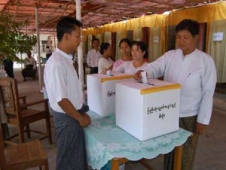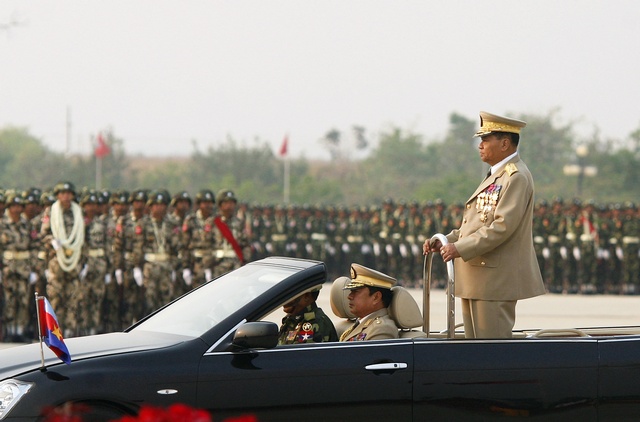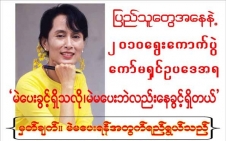 “We reject the 2008 constitution for being undemocratic and unfair. We want to make people aware of this fact and sticking posters in public places is a good way to get the word out,” spokesperson Min Yan Naing told Democratic Voice of Burma.
“We reject the 2008 constitution for being undemocratic and unfair. We want to make people aware of this fact and sticking posters in public places is a good way to get the word out,” spokesperson Min Yan Naing told Democratic Voice of Burma.
GW started off its campaign against the election commission on 12 August 2010, which marked the beginning of International Youth Year. The average age in their camp is 23.
Endorsing Election Commission’s words
10 GW comrades accomplished their mission on 12 August, sticking posters in buses, pavements, parking lots, public rest rooms and lamp posts in Rangoon’s Dagon-Myo-Thit, Inn-Sein, Hlaing-Thar-Yar, Mingalardon, Bayint-Naung, Yazana Plaza, Dagon center areas.
“It is a huge risk we are taking, especially with the Special Branch Police officers patrolling under cover. But it is fortunate that none of our team members have faced any danger yet,” Naing says, adding that they are actually only endorsing the Election Commission’s diktat which states: “It is your right to vote or to abstain from the 2010 elections.”
GW opposes new constitution
GW opposes three major aspects of the 2008 constitution. Firstly, according to the Constitution, the Army has already secured 25 percent of the parliamentary seats irrespective of the outcome of the elections, giving them an unfair advantage in future parliamentary proceedings.
Secondly, the people of Burma will no t directly affect the Presidential candidate, that right lies exclusively with the three vice-presidents – two of whom will be chosen by the two parliaments and one will be appointed directly by the military.
t directly affect the Presidential candidate, that right lies exclusively with the three vice-presidents – two of whom will be chosen by the two parliaments and one will be appointed directly by the military.
Finally, the lack of freedom to non-junta endorsing political parties to campaign prior to the elections makes it difficult for them to get their message across to the masses.
Mixed responses
The move initiated by GW has been met with mixed responses. “Some people on the streets give us a look of approval, but in one of the areas, we saw that the posters had been ripped apart. We aren’t yet sure whether that was a junta-initiated drive,” Naing said.
With the election date being announced, Naing and clan have started working on their campaigns for 7, November 2010; “We have to chalk out a detailed plan, but right now our main aim will be to get on to the streets and persuade people to boycott the elections,” he said.
In the run up to the election, GW hopes to form alliances with other democracy groups in order to extend their sphere of operation beyond Rangoon.
Background
There will be 330 seats in the peoples parliament in Burma being contested and a further 110 seats reserved solely for members of the military, whilst a ‘House of Nationalities’ or Amyotha Hluttaw will comprise 224 seats with 56 of those reserved for the military. This  will have 12 representatives from each of the administrative regions (states).
will have 12 representatives from each of the administrative regions (states).
To alter the constitution it must have the consent of 75% of parliamentarians. This will make alteration particularly difficult as even if progressive parties dominate, the presence of even a few Union Solidarity Development Party (USDP), essentially a military party, will tip the balance beyond the possibility of reform.
The constitution also stipulates that the military cannot face trial in a civilian court and importantly the home minister, defence, security and border control will all be nominated by the commander in chief of the military.
The voting for the new constitution was highly dubious, with approval apparently at over 92%, most found it hard to see it as a credible exercise in democracy, as it was roundly criticised by experts, casting serious doubt about the legitimacy in the upcoming election.
HRH Oslo, based on Democratic Voice of Burma information. See the original articles here and here.
Related links:
"Article 19" submits report to UN as election date in Burma announced as 7 November
Burma: 2010 elections may bring no change
Burma: 2010 elections will define the political landscape for years to come
A critical point in Burma’s history





